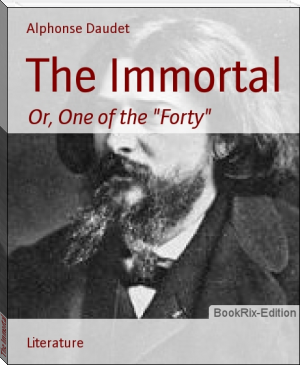Jack by Alphonse Daudet (web ebook reader txt) 📖

- Author: Alphonse Daudet
Book online «Jack by Alphonse Daudet (web ebook reader txt) 📖». Author Alphonse Daudet
They alighted at the fashionable confectioner's, where there was a great crowd. Rich furs and rustling silks crushed each other; and women's faces with veils half lifted were reflected in the surrounding mirrors which were set in gilt frames and cream-colored panels; glittering glass, and a variety of cakes and dainties delighted the spectators. Madame de Barancy and her child were much looked at. This charmed her, and this small success following upon the mortification of the previous hour, gave her an appetite. She called for a quantity of meringues and nougat, and finished by a glass of wine. Jack followed her example, but with more moderation, his great grief having filled his eyes with unshed tears and his heart with suppressed sighs.
When they left the shop the weather was so fine, although cold, and the flower-market of the Madeleine so fragrant with the sweet perfume of violets, that Ida determined to dismiss the carriage and return on foot. Briskly, and yet with a certain slowness of step, that indicated a woman accustomed to admiration, she started on her walk, leading Jack by the hand. The fresh air, the gay streets and attractive shops, quite restored Ida's good-humor. Then suddenly, by what connection of ideas I know not, she remembered a masqued ball to which she was going that night, preceded by a restaurant dinner.
"Mercy! I had forgotten. Hurry! little Jack--quick!" She wanted flowers, a bouquet, a dozen forgotten trifles: and the child, whose life had always been made up of just such trifles, and who felt as much as his mother the subtile charm of these elegances, followed her in high glee, delighted by the idea of the fete that he was not to see. The toilette of his mother always interested him, and he fully appreciated the admiration her beauty excited as they went through the streets and into the various shops.
"Exquisite! exquisite! Yes, you may send it to me--Boulevard Haussmann."
Madame de Barancy tossed down her card, and went out, talking gayly to Jack of the beauty of her purchases. Suddenly she assumed a graver air. "Remember, Jack, what I say. Do not tell our good friend that I went to this ball; it is a great secret, It is five o'clock. How Constant will scold!"
She was not mistaken.
Her maid, a tall, stout person of forty years, ugly and masculine, rushed toward Ida as she entered the house.
"The costume is here. There is no sense in being so late. Madame will not be ready in season. No one could make her toilette in such a little while."
"Don't scold, Constant. If you only knew what had happened. Look!" and she pointed to Jack.
The factotum seemed utterly out of patience. "What! Master Jack back again! That is very naughty, sir, after all you promised. The police will have to come and take you to school; your mother is too good."
"No, no, it was not he. The priest would not have him. Do you understand? They insulted me!" Whereupon she began to cry again, and to ask of heaven why she was so unhappy. What with the meringues and the nougat, the wine and the heat of the room, she soon felt very ill. She was carried to her bed; salts and ether were hastily sought. Mademoiselle Constant acquitted herself with the propriety of a woman who is no stranger to such scenes, went in and out of the room, opened and shut wardrobes, with a certain self-possession that seemed to say, "This will soon pass off." But she did not perform her duties in silence.
"What folly it was to take this child to the Fathers! As if it was a place for him in his position! It would not have been done certainly, had I been consulted. I would engage to find a place for this boy at very short notice."
Jack, terrified at seeing his mother so ill, had seated himself on the edge of the bed; where, looking at her anxiously, he in silence asked her pardon for the sorrow he had caused her.
"There! get away, Master Jack. Your mother is all right. I must help her dress now."
"What! You do not mean, Constant, that I must go to this ball. I have no heart to amuse myself."
"Pshaw! I know you, madame. You have but five minutes. Just look at this pretty costume, these rose-colored stockings, and your little cap."
She shook out the skirts, displayed the trimming, and jingled the little bells which adorned it, and Ida ceased to resist.
While his mother was dressing, Jack went into the boudoir, and remained alone in the dark. The little room, perfumed and coquettish, was, it is true, partially illuminated by the gas lamps on the boulevard. Sadly enough the child leaned against the windows and thought of the day that was just over. By degrees, without knowing how, he felt himself to be "the poor child" of whom the priest had spoken in such compassionate tones.
It is so singular to hear one's self pitied when one believes one's self to be happy. There are sorrows, in fact, so well concealed, that those who have caused them, and even sometimes their victims, do not divine them.
The door opened--his mother was ready.
"Come in, Master Jack, and see if this is not lovely."
Ah! what a charming Folly! Silver and pink, lustrous satin and delicate lace. What a lovely rustling of spangles when she moved!
The child looked on in admiration, while the mother, light and airy, waving her Momus staff, smiled at Jack, and smiled at herself in the Psyche, without at that time asking heaven why she was so unhappy. Then Constant threw over her shoulders a warm cloak, and accompanied her to the carriage, while Jack, leaning over the railing, watched from stair to stair, moving almost as if she were dancing the little pink slippers embroidered with silver, that bore his mother to balls where children could not go. As the last sound of the silver bells died away, he turned towards the salon, disturbed and anxious for the first time by the solitude in which he ordinarily passed his evenings.
When Madame de Barancy dined out, Master Jack was confided to the tender mercies of Constant. "She will dine with you," said Ida.
Two places were laid in the dining-room that seemed so huge on such days. But very often Constant, finding her dinner anything but cheerful, took the child and joined her companions below, where they feasted gayly. The table-cloth was soiled, and the conversation was not of the purest; and very often the conduct of the mistress of the house was commented upon, in words to be sure that were slightly veiled, so as not to frighten the child. This evening there was a grand discussion as to the refusal of the Fathers to receive the boy. The coachman declared that it was all for the best,--that the priests would have made of the child "a hypocrite and a Jesuit."
Constant protested against these words. She was not a professor of religion, she said, but she would not hear it spoken ill of. Then the discussion changed to the great disappointment of Jack, who listened with all his little ears, hoping to hear why this priest, who appeared so good, was not willing to receive him.
But for the moment Jack was of little consequence; each was absorbed in narrating his or her religious convictions.
The coachman, who had been drinking, said that his God was the sun; in fact, he, like the elephants, adored the sun! Suddenly some one asked how he knew that elephants adored the sun.
"I saw it once in a photograph," said he, sternly. Upon which Mademoiselle Constant vehemently accused him of impiety and atheism; while the cook, a stout Picardian with true peasant shrewdness, told them to be quiet.
"Hush!" she said; "you should never quarrel over your religions."
And Jack--what was he doing all this time?
At the end of the table, stupefied by the heat and the interminable discussions of these brutes, he slept, with his head on his arms, and his fair curls spread over his velvet sleeves. In his unrestful slumber he heard the hum of the servants' voices, and at last he fancied that they were talking of him; but the voices seemed to reach from afar off--through a fog, as it were.
"Who is he, then?" asked the cook.
"I don't know," answered Constant; "but one thing is certain, he can't remain here, and she wishes me to find a school for him."
Between a yawn and a hiccough, the coachman spoke,--
"I know a capital school, and one that will, just answer your purpose. It is called the Moronval College--no, not college--but the Moronval Academy. But what of that? it is a college all the same. I put my child there once, when I was ordered off with the Egyptian army. The grocer gave me the prospectus, and I think I have it still."
He looked in his portfolio, and from among the tumbled and soiled papers he extracted one, dirtier even than the others.
"Here it is!" he cried, with an air of triumph.
He unfolded the prospectus and began to read, or rather to spell with difficulty:
"Gymnase Moronval--in the--in the--"
"Give it to me," said Mademoiselle Constant; and taking it from him, she read it at one glance.
"Moronval Academy--situated in the finest quarter of Paris--a family school--large garden--the number of pupils limited--course of instruction--particular attention paid to the correction of the accent of foreigners--"
Mademoiselle Constant interrupted herself here to breathe, and to exclaim, "This seems all right enough!"
"I think so," said the cook.
The reading of the prospectus was resumed, but Jack was soundly asleep, and heard no more.
He was dreaming. Yes, while his future was thus under discussion around this kitchen-table, while his mother was dancing as Folly in her rose-colored skirts and silver bells, he was dreaming of the kind priest, and of the tender voice that had murmured--"Poor child!"
CHAPTER II.~~THE SCHOOL IN THE AVENUE MONTAIGNE.
"23 Avenue Montaigne, in the best quarter of Paris," said the prospectus. And no one can deny that the Avenue Montaigne is well situated in the Champs Elysees, but it has an incongruous unfinished aspect, as of a road merely sketched and not completed.
By the side of the fine hotels with their plate-glass windows hung with silken draperies, stand the houses of workmen, whence issue the noise of hammers and grating of saws. One part of the Faubourg seems also to be relinquished to gardens after the style of Mabille.
At the time of which I speak, and possibly now? from the avenue ran two or three narrow lanes whose sordid aspect offered a strange contrast to the superb buildings near them. One of these lanes opened at the number 23, and announced on a gilded sign swinging in the passage, that the Moronval Academy was there situated. This sign, however, once passed, it seemed to you that you were taken back forty years, and to the other end of Paris. The black mud, the stream in the centre of the lane, the reverberations from the high walls, the drinking-shops built from old planks, all seemed to belong to the past. From every nook and cranny, from stairs and balconies, whence fluttered linen hung to dry, streamed forth a crowd of children escorted by an army of lean and hungry cats. It was amazing to see that so small a spot could accommodate such a number of persons. English grooms in shabby liveries, worn-out jockeys, and dilapidated body-servants, seemed there to congregate. To these must be added the horde of workpeople who returned at sunset;
 Have you ever thought about what fiction is? Probably, such a question may seem surprising: and so everything is clear. Every person throughout his life has to repeatedly create the works he needs for specific purposes - statements, autobiographies, dictations - using not gypsum or clay, not musical notes, not paints, but just a word. At the same time, almost every person will be very surprised if he is told that he thereby created a work of fiction, which is very different from visual art, music and sculpture making. However, everyone understands that a student's essay or dictation is fundamentally different from novels, short stories, news that are created by professional writers. In the works of professionals there is the most important difference - excogitation. But, oddly enough, in a school literature course, you don’t realize the full power of fiction. So using our website in your free time discover fiction for yourself.
Have you ever thought about what fiction is? Probably, such a question may seem surprising: and so everything is clear. Every person throughout his life has to repeatedly create the works he needs for specific purposes - statements, autobiographies, dictations - using not gypsum or clay, not musical notes, not paints, but just a word. At the same time, almost every person will be very surprised if he is told that he thereby created a work of fiction, which is very different from visual art, music and sculpture making. However, everyone understands that a student's essay or dictation is fundamentally different from novels, short stories, news that are created by professional writers. In the works of professionals there is the most important difference - excogitation. But, oddly enough, in a school literature course, you don’t realize the full power of fiction. So using our website in your free time discover fiction for yourself. 




Comments (0)